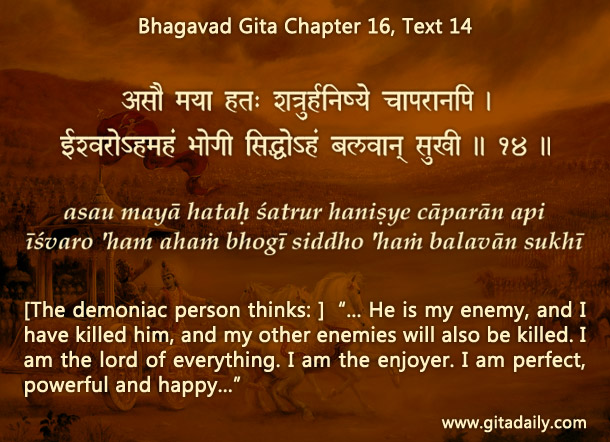
We all have our weaknesses such as succumbing to temptations and compromising principles for expediency. Having weaknesses is a part of the package of being human.
But the human package also includes the voice of conscience – the capacity to discern right from wrong. By listening to it, we can see weaknesses as weaknesses. Or by muting it, we can see them as strengths.
For example, suppose a person in a position of power is short-tempered and that person’s subordinates who receive the brunt of the anger don’t have the power to retaliate. On seeing them cringe and cower, the irritable boss may get a perverse thrill – a sense of power that fosters the dangerous delusion: “Anger is my strength. Just see how it sets people right.” The voice of conscience protests, but is neglected or silenced – the exhilaration of power is too heady to pay heed to anything else. Thus, weakness degenerates into meanness and one heartlessly hurts others to further one’s selfish ends.
The Bhagavad-gita in a two-verse sequence (16.13-14) outlines how the weakness of greed degrades into the meanness of murder: greed impels the ungodly to kill their competitors with no compunction whatsoever – with a sadistic delight instead.
Thankfully, this degeneration of weakness to meanness is not just preventable but also reversible. How? By spiritual wisdom and devotion. Gita wisdom boosts our weak conscience and helps us recognize weakness as weakness. Further, it introduces us to bhakti-yoga that connects us with the reservoir of all strength, Krishna. By practicing bhakti-yoga, we gain a higher happiness that strengthens us in the fight against weakness-induced urges. The more we resist those urges, the more they become starved and weakened. Thus, steady devotional service to Krishna weakens our weaknesses and strengthens us till finally we go beyond their reach.


Cant help but appreciate this beautiful presentation.
At a loss of words to express !!
Such a clear-cut analysis of Anarthas….Prabhuji……
Thanks for sharing this wisdom…..
Hare Krishna.
Krishna bhakti is ‘the’ strength that revives one from the depth of our weaknesses.
Hare Krsna thank you for addressing the issue. We’ve all been agreidos in previous lives and have been aggressors. Thank you for allowing us to Krsna devotional service